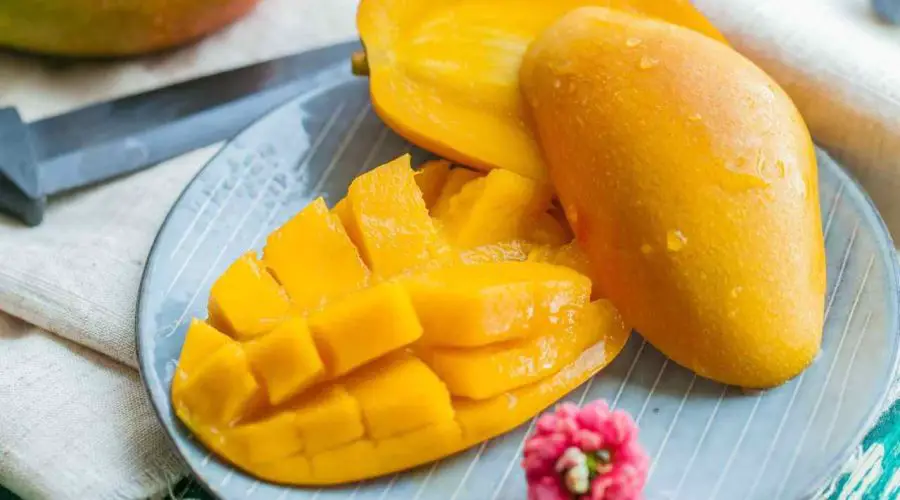Are Mangoes Good for Pregnancy? Mango in Pregnancy
Keeping the Long Story Short, YES You Can Eat Mangoes While you’re Pregnant.
Mangoes are rich in iron, vitamin C, vitamin A, vitamin B6, potassium and folic acid, and fibres which are all vital nutrients for your pregnancy. They are also a good source of energy and antioxidants.
However, certain things need to be taken care of while eating mangoes during pregnancy.
Things to Keep in Mind While Eating Mangoes During Pregnancy
Avoid Overindulgence
During pregnancy, it is essential to refrain from overindulging in mangoes. Consult your physician regarding the recommended daily intake. Mangoes are rich in antioxidants and vitamins that can aid in foetal development but consuming more than the recommended quantity could be harmful. It is generally advised to consume no more than one mango each day.
Avoid Artificially Ripened Mangoes
When purchasing mangoes at the market, be selective. Ensure you do not purchase mangoes that have been chemically ripened. Ensure you purchase them within their season; this will limit the probability that they have been artificially ripened.
As the chemical contains elements of arsenic and phosphorus, artificially ripened fruits might be harmful to both you and your growing child.
The consumption of artificially ripened fruit can cause stomach discomfort, headaches, dizziness, drowsiness, disorientation, mood disturbances, mouth ulcers, seizures, and tingling in the hands and feet.
Regulate Eating Timings
As they are heavy in calories, mangoes should be consumed during breakfast and avoided at dinner. Mangos should only be consumed if your doctor advises you to increase your calorie intake. Avoid combining mangoes with ice cream or sugar, as doing so can result in an imbalance of calories. Mangoes are not recommended for diabetes or overweight mothers.
Eat in its Natural Form
It is preferable to consume mangoes in their natural state as opposed to as pickled ones. Mango pickles can increase acidity and exacerbate pregnancy complications. The pickles’ excessive salt and oil content are also problematic.
4 Health Benefits of Eating Mangoes During Pregnancy
Controls Digestive Health
Due to their high fibre content, mangoes keep you feeling full for longer. In the early stages of pregnancy, women can have a variety of stomach disorders, which mangoes help remedy.
Beats Anaemia
Mangoes are not the richest source of iron, but they nonetheless contribute to an increase in haemoglobin levels. Mangos include vitamin C, which facilitates iron absorption in the body. Mangoes can help pregnant women in India who suffer from low haemoglobin levels.
Aids Foetal Development
Folic acid found in mangoes can aid in foetal brain and spinal cord development. In early pregnancy, neural tube defects are prevalent, but mango eating helps avoid them. Vitamin B6 stimulates the development of the foetus’ brain and nervous system.
Prevents Nausea and Vomiting
Mangoes include Vitamin B6, which can be used to combat nausea and morning sickness. Additionally, the fruit has a refreshing and sweet flavour, allowing it to combat vomiting tendencies.
There are numerous health benefits to eating mangoes during pregnancy. However, certain precautions must be taken to ensure that the mother and child can safely enjoy the King of Fruits!
[BONUS] SIGNS You Can Look for If Mangoes Have Been Exposed to Toxins
Mangoes exposed to toxins may show the following signs:-
- They have a greyish-white or black powdery coating;
- They have a garlic-like odour;
- They appear ripe on the outside, but be hard and raw on the inside;
- They may be tasteless or have a peculiar aftertaste;
- They have a short shelf life;
- They will show black spots or signs of over-ripening much sooner than naturally ripened mangoes;
- They may be soft and pulpy;
[BONUS] Steps to Reduce Exposure to Toxins
If you are unsure if mangoes have ripened naturally or unnaturally, you can reduce their exposure to toxins by following these steps:
• Wash the Fruit: When you return home from the market or mandi, thoroughly wash and dry the mangoes. This will eliminate any chemical residue on the surface as well as any listeria contamination in the soil. In addition to keeping your refrigerator clean, it will reduce cross-contamination.
• Wash Your Hands: Wash your hands with soap and warm water, as well as any material that came into touch with the mangoes, such as knives or a cutting board.
• Do not Consume the Skin: peel the mango before eating it after washing it. Do not consume the fruit’s flesh immediately from the skin.

